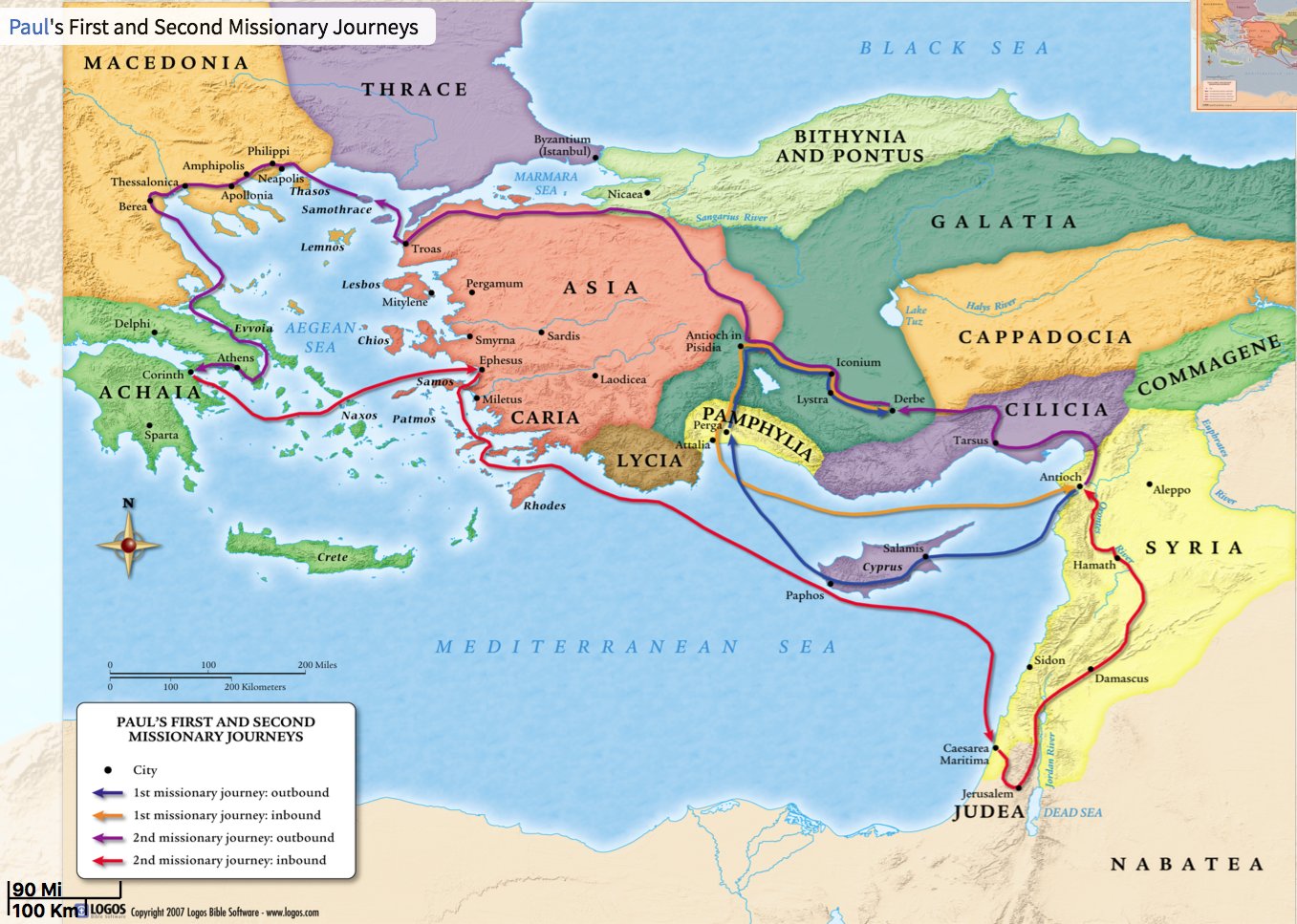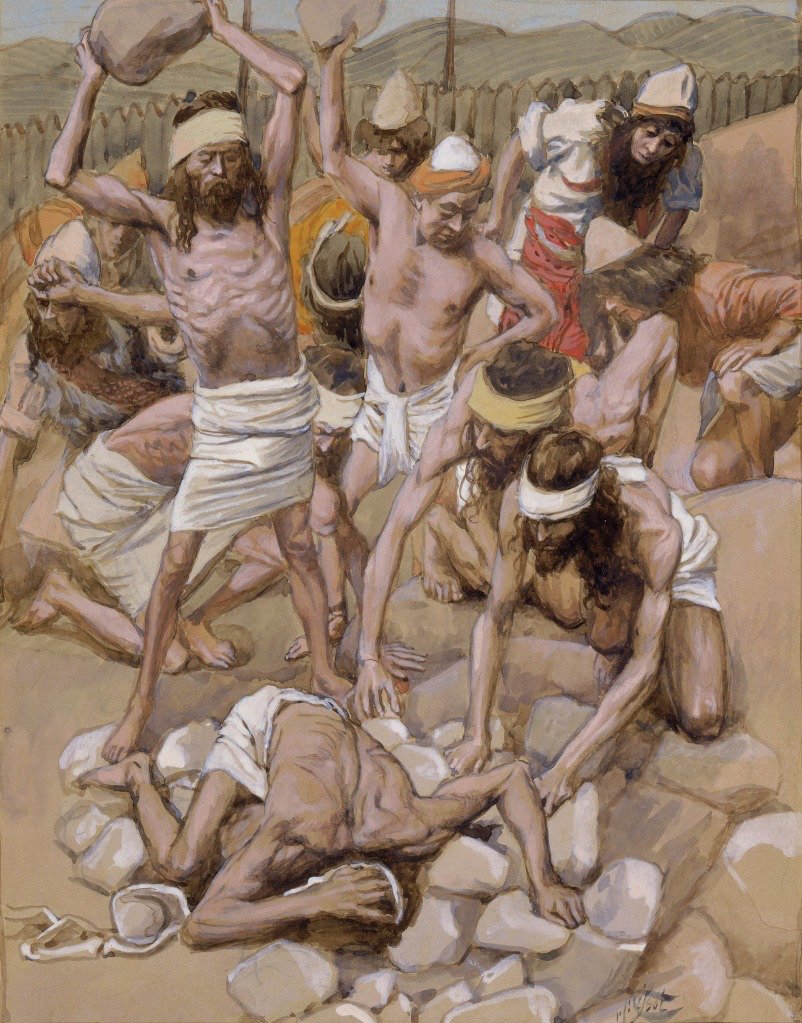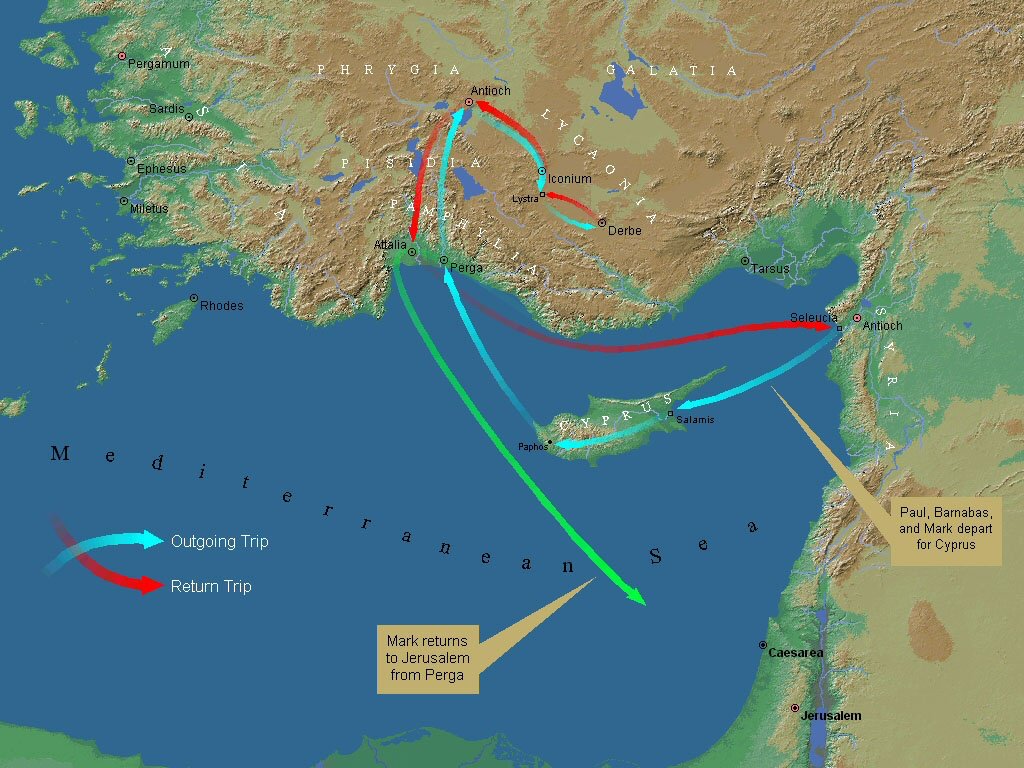Blog Post
Posted by Dion Todd July 1st, 2018 5,418 Views 0 Comments
Today we are going to study Acts chapter 14 in depth. You can follow along in your own Bible if you like. I will be reading from the World English Bible because it is the only modern English translation that is copyright free, and I can read the entire Bible on video without any legal drama or breaking anyone’s rules. After you finish this study, please take the accompanying quiz to test your knowledge. Thanks to everyone that has participated so far. Let’s get started:
First let’s set our location and do a brief catchup. In Acts chapter 13, while the church in Syrian Antioch fasted and prayed, the Holy Spirit directed them to send Saul and Barnabas out on a mission trip.

We should also note that during Acts chapter 13, the author Luke changes from using Saul’s Hebrew name of Saul, to calling him by his Roman name: Paul. We cannot be sure why, but it may have been out of humility, because his namesake Saul was a king in Israel. This is where we begin our story today.
Acts Chapter 14 beginning in verse 1, reading from the World English Bible: In Iconium, they entered together into the synagogue of the Jews, and so spoke that a great multitude both of Jews and of Greeks believed.
It is worth noting that Paul tended to stay in cities or regions that accepted the gospel for extended periods of time strengthening and teaching them. Some of the persecution they faced may have been God’s way of moving them on to Iconium and other places.
Though the leaders of the synagogue in Pisidian Antioch had just expelled Paul and Barnabas from their city, when they came to Iconium, they began by preaching in the synagogue there. It was apparently a good place to start.
Iconium was an ancient city that claimed to be older than Damascus. In the dim past it had a king named Nannacus, and the phrase “since the days of Nannacus” meant “from the beginning of time.” There were no large Roman garrisons in Iconium, so it remained more Greek in attitude and was somewhat resistant to Roman authority. They were governed by an assembly of citizens called the Demos, which held itself distant from the Roman representative. Here the missionaries met with immediate success, followed by immediate opposition.
2 But the disbelieving Jews stirred up and embittered the souls of the Gentiles against the brothers. 3 Therefore they stayed there a long time, speaking boldly in the Lord, who testified to the word of his grace, granting signs and wonders to be done by their hands. 4 But the multitude of the city was divided. Part sided with the Jews, and part with the apostles.
Many of the Jews and Greeks at Iconium believed but others rejected the message and stirred up the people against them. Still, they stayed as long as they could, despite the opposition, leaving only when it became absolutely necessary. They did this because they knew that these Christians in Iconium needed all the grounding they could get to stand strong in a city with that much opposition. Also, this is the first time in scripture that Paul and Barnabas are called Apostles, and remember, they both came to know Jesus after His resurrection. So new Apostles were still being added to the church.
5 When some of both the Gentiles and the Jews, with their rulers, made a violent attempt to mistreat and stone them, 6 they became aware of it and fled to the cities of Lycaonia, Lystra, Derbe, and the surrounding region. 7 There they preached the Good News.
Finally the rulers turned against them and the opposition became so bad that the apostles had to leave town. Because of the weak Roman control, the people were going to stone them to death. They would have never attempted this if the Roman rule had been strong enough there, because killing someone was illegal. Paul and Barnabas were brave but not foolish, and they left town. They were born-again, not born yesterday. We should not that the Lord protects his children, but He wants us to use common sense. The missionaries departed to find others that were willing to listen to their message.
The apostles had now been booted out of two cities back-to-back, but they kept serving Christ and proclaiming His gospel. Undoubtedly, they felt some discouragement. Some of the things that were said to them had to have hurt. They may have worried about leaving some baby Christians behind. Yet they dusted themselves off, and continued onward. Paul wrote in Philippians 4:13 “I can do all things through Christ who strengthens me.” So Paul and Barnabas moved another twenty-six miles out into the wilds to a place called Lystra.
Though little is known of the origin of Lystra, we know that it was a frontier outpost. Caesar Augustus had made it a Roman colony in 6 B.C., establishing it as the easternmost of the fortified cities of Galatia. I imagine it had a sort of “old-west” flavor and spirit. Most of the people were uneducated Lycaonians who had their own language. The people were half barbarians. The Romans ruled the land, the Greeks controlled the commerce, and the Jews had little influence there. In fact, there was no synagogue in Lystra, so the ministry work started with the healing of a crippled man.
8 At Lystra a certain man sat, impotent in his feet, a cripple from his mother’s womb, who never had walked. 9 He was listening to Paul speaking, who, fastening eyes on him, and seeing that he had faith to be made whole, 10 said with a loud voice, “Stand upright on your feet!” He leaped up and walked.
Paul saw this man’s response and, following the guidance of the Holy Spirit, healed him without warning. Paul had everyone’s undivided attention as the ex-cripple (whom everyone knew) danced in front of the people and cried out, “Can this be true? I have never walked in my life before! Look, Mom—no cane!” Now Paul had their attention and could preach to them, so he shared the life of Jesus and the atoning work on the cross. It was great, the people were open and loved the Apostles.
There was just one complication: these half-wild Lycaonians had an ancient legend that the Greek gods Zeus and Hermes had once come to the hill country disguised as mortals seeking lodging. Though they asked a thousand homes, no one would take them in. Finally, at a humble cottage of straw and reeds, a poor elderly couple, Philemon and his wife Baucis, freely welcomed them and feasted them with what little they had. In appreciation, the gods transformed the cottage into a temple, making the couple priest and priestess. The legend has it that when they died, they were immortalized as a great oak and a great linden tree. The homes that did not invite them in, were destroyed. These poor Lycaonians were determined not to let that happen again, not on their watch.
11 When the multitude saw what Paul had done, they lifted up their voice, saying in the language of Lycaonia, “The gods have come down to us in the likeness of men!” 12 They called Barnabas “Jupiter”, and Paul “Mercury”, because he was the chief speaker.
When the crippled man, who had never walked before, was suddenly healed, they thought that the gods were walking among them again. Some translations use Zeus and Hermes here. Barnabas apparently had a more authoritative, or noble presence because they thought he was the chief god, and that Paul spoke for him. Maybe Barnabas was the strong silent type. As the town buzzed with the news, the people prepared to make a sacrifice to them.
Poor Paul and Barnabas did not know what was going on, because when the people became excited, they began to speak in Lycaonian, their native tongue. The devil was having a blast. What had started out with such promise, was now about to be ruined with idolatry.
13 The priest of Jupiter, whose temple was in front of their city, brought oxen and garlands to the gates, and would have made a sacrifice along with the multitudes.
When the priest came with sacrificial oxen with garlands on their horns, Paul and Barnabas were horrified. Now they understood what was happening.
14 But when the apostles, Barnabas and Paul, heard of it, they tore their clothes, and sprang into the multitude, crying out, 15 “Men, why are you doing these things? We also are men of like passions with you, and bring you good news, that you should turn from these vain things to the living God, who made the sky, the earth, the sea, and all that is in them; 16 who in the generations gone by allowed all the nations to walk in their own ways. 17 Yet he didn’t leave himself without witness, in that he did good and gave you rains from the sky and fruitful seasons, filling our hearts with food and gladness.”
Tearing one’s robe was the traditional Hebrew way of responding to a violation of sacred things. Paul and Barnabas basically said: “Hey, we are not gods, we are just like you! Look we have five fingers and five toes—count ’em yourself!”
Then Paul tried to preach to them. It was good as far as he got. He did not preach the Old Testament as he did with the Jews but used a simple argument, for pagan people, based on what they could see of nature, the sky, the earth, the sea. If he had been able to continue his message, he would have gone on to the gospel, but that was not to be.
18 Even saying these things, they hardly stopped the multitudes from making a sacrifice to them.
It is often too easy to exalt the messenger, instead of the message. We often want to make men and women, rather than God, our sense of security but it is dangerous for any spiritual leader to cultivate or allow this kind of hero-worship. It’s all about Jesus, He is the man of the hour. His people are just like a water hose that His Spirit flows through. People sense the beauty and grace of Him inside of us, and mistakenly think that it is us, when it is not. That leads to failure, for when we began to idolize people, God will reveal their flaws, their humanity, and we may end up despising them.
Behind the scenes, satan was giving them his best shot—manipulation at its worst. The apostles had been locked out of Pisidian Antioch and Iconium as heretics, and now they were being idolized in Lystra. It is difficult to say which was worse—having stones thrown at them or this crazy attempt to worship them as gods. We can see that satan was trying, testing them for a weakness to get them out of balance. That is his plan for us, to get us out of balance, out of step with the Holy Spirit. When persecution didn’t work, he offered them the praise of the people, anything to sidetrack what they were doing. It kept Paul and Barnabas from presenting the full truth, and the people from listening.
The people of Lystra could only fit Jesus into their existing religious views, on their own terms. Paul wanted them to turn from these useless things to the living God, and not merely add Jesus to their pagan ways. Making Jesus into something else, is still idolatry. We tend to cut Christ down to our size and squeeze Him into the straitjacket of one of our little gods that we are familiar with. That way He is safe and always at a distance. In many parts of America Jesus is a V.I.P. to be honored but not truly believed or followed. Jesus is merely a custom, and not the Lord of our lives. Calling Jesus Lord merely gives Him a title. It is doing what He said that makes Him the Lord of your life, and too few do that.
When Jesus came triumphantly into Jerusalem on the colt of a donkey on Palm Sunday two thousand years ago, the people were delirious with praise, singing “Blessed is He who comes in the name of the Lord” and “Hosanna in the highest!” But when He began to speak of His coming death, their enthusiasm began to cool. The cross did not fit their preconceptions of the Messiah. Finally they shouted, “Away with him. Crucify him!”
It is was the same at Lystra and it is the same today. Almost everyone will receive Jesus as the greatest man who ever lived. Just leave it there and everything will be fine. Enlightened circles are comfortable with calling Jesus the supreme psychologist of history. He is safe as the most important person of all time. The safe, sweet Jesus, meek and mild—sentimental, impotent, distant—is no threat. The baby Jesus. The world will do anything for a Christ who is limited by our own perspectives. What it will not do is receive him as Lord! We all sometimes wear blinders as we read the Bible, seeing what we think supports our preconceived system and missing the things that do not fit our beliefs. It is only with God’s help and grace that such serious error can be avoided or changed.
I meet people sometimes that say things so far out, so wrong, and so confidently, that I just nod and say: “Ooo K” and move on, because I feel there is not enough time in my life to teach them the truth, and that they would not listen to it anyway because they are too busy convincing me. Words would have never convinced Saul of Tarsus that Jesus was Lord. He had to meet Him for himself on the road to Damascus and be struck blind to wake up. Some things are best left to the Holy Spirit to deal with in His own time.
19 But some Jews from Antioch and Iconium came there, and having persuaded the multitudes, they stoned Paul, and dragged him out of the city, supposing that he was dead.
Paul and Barnabas did not receive worship by men for even a split second, but immediately tried to correct their thinking. They did not say “Well, we’ll straighten them out later. Let them have their fun” but tried to point the people to Jesus.
Then the angry Jews from Antioch and Iconium came and turned the people against them. It was not enough to drive them out of their own town, so they followed Paul and Barnabas to other towns and criticized them there. These people traveled more than one hundred miles just to make Paul miserable. They were dedicated adversaries. It was a reverse and perverse fan club of haters doing satan’s work, while hiding behind a religious mask. Not everyone who can quote scripture is “good” and even demons believe in God.
If the people of Lystra could not fit Paul and Barnabas into their neat little religious system, they would do away with them. Hell hath no rage like a worshiper scorned! They quickly turned on them and stoned Paul to death.

Soon Paul lay on the ground as a blood-spattered, broken man beneath the rubble of Lystra. Maybe this is when he experienced the ecstasy of being caught up into the third heaven as he described in 2 Corinthians 12:1–4. We don’t know. To the Galatians he would later write, “Finally, let no one cause me trouble, for I bear on my body the marks of Jesus” (6:17). Some of those marks were picked up here.
20 But as the disciples stood around him, he rose up, and entered into the city. On the next day he went out with Barnabas to Derbe.
As Paul lay there, the disciples stood around him deciding what to do with his body, and it is a very strong possibility that he was dead. Tears streamed down the disciple’s faces. “What a pity—he was in the prime of his life and ministry. If only he could have lived longer.” Then suddenly Paul popped one eye open, then the other, and he stood up. “It’s all right, brothers and sisters! There will be no funeral today! Let’s get out of here!”
Paul arose and went back into the city of Lystra. What a witness! This had more effect than a thousand sermons. Paul, caked with blood and dirt, must have been quite a spectacle and he was obviously not afraid of what men could do to him. Nothing could deter Paul and Barnabas from bravely preaching about Jesus Christ.
Interestingly, Lystra was the city from which Paul would recruit Lois and Eunice and their young grandson/son Timothy. Even with such resistance, they made quite an impact on the city. After this, they traveled to Derbe, a trip of about 20 miles.
Derbe was a frontier city in the Roman province of Galatia, which is located in modern Turkey. It is the last city that Paul and Barnabas visit on the first mission trip. Gaius of Acts Chapter 20 was from Derbe and became a companion of Paul on his third journey (Acts 20:4). This mission trip established the churches in Galatia. After this, Paul and Barnabas backtracked through the towns they had previously ministered in.
21 When they had preached the Good News to that city, and had made many disciples, they returned to Lystra, Iconium, and Antioch, 22 strengthening the souls of the disciples, exhorting them to continue in the faith, and that through many afflictions we must enter into God’s Kingdom. 23 When they had appointed elders for them in every assembly, and had prayed with fasting, they commended them to the Lord, on whom they had believed.
The apostles had left behind only a tiny core of believers in each town, and these had hardly been taught anything, since the apostles had been there at best for only a few weeks. But it was a work of God and the Holy Spirit took care of them. Now Paul and Barnabas visited the little assemblies that they had set up and encouraged them, taught them, and after prayer and fasting, they appointed elders.
It is interesting to think on what Paul taught them. It reads: “through many afflictions we must enter into God’s Kingdom.” Overall, that is a forgotten message today and you don’t hear that preached much, but it is the underlying truth of giving your life to Jesus. David wrote in Psalm 34:19 (NKJV) “Many are the afflictions of the righteous, But the LORD delivers him out of them all.” That is how David lived, it is how Jesus lived, it is how Peter, Paul, Barnabas, and the other Christians lived. We face troubles, but the Lord delivers. Expect trouble, and expect Him to deliver you. I don’t know how, but I know that God will take care of me.
24 They passed through Pisidia, and came to Pamphylia. 25 When they had spoken the word in Perga, they went down to Attalia. 26 From there they sailed to Antioch, from where they had been committed to the grace of God for the work which they had fulfilled.
After the first mission trip was completed, they returned to Syrian Antioch, which became their home base after the Apostle James was beheaded in Jerusalem.
27 When they had arrived, and had gathered the assembly together, they reported all the things that God had done with them, and that he had opened a door of faith to the nations. 28 They stayed there with the disciples for a long time.
Paul gathered the assembly at Antioch together and with Barnabas, the Son of Encouragement by his side, told them about the mission trip. It would have been something like this:

What a story. It had been a very fruitful trip as they worked hand-in-hand with the Holy Spirit. New churches were established in many cities and elders were appointed to watch over them. They had met a lot of resistance, faced down sorcerers, were driven out of towns, and were abandoned by members of the team. Paul was stoned and left for dead, but God delivered them every single time, and in the end they accomplished their mission. So will all of us if we stay the course and do not give up when adversity comes.
This concludes today’s chapter of our ongoing Bible Study. Thank you for participating and being a part of Refreshing Hope! To complete this study, we invite you to test your knowledge with the accompanying quiz!

